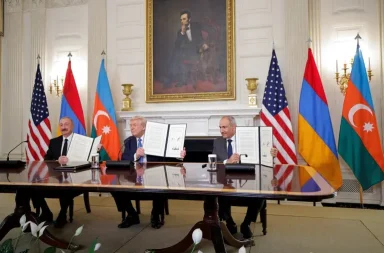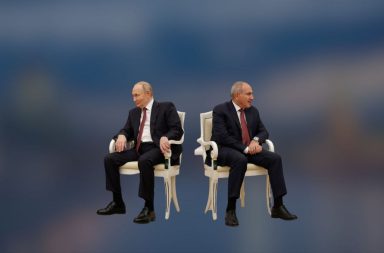by David Bishop
An Armenian delegation, led by the newly appointed Director of the National Security Service (NSS), Andranik Simonyan, participated in the Third Baku Security Forum, which took place in Azerbaijan from September 19 through the 21. Those dates were the anniversary of the expulsion of the entire Armenian population from Artsakh, followed by Armenian Independence Day on September 21. Yet instead of commemorating Armenian independence, Armenian representatives were busy negotiating in Baku with Azerbaijan.
According to the State Security Service of Azerbaijan, the organizers of the event, the forum in Baku focused on strategies for preventing humanitarian crises, terrorist threats, and man-made disasters. Preventing humanitarian crises is a strange objective for Azerbaijan, which caused an enormous humanitarian crisis two years ago this week. As for terrorist threats, Azerbaijan is well-known for labelling ethnic Armenians in Artsakh as “terrorists”.
The move to participate in such a forum marks a notable shift in Yerevan’s approach. In November 2024, Armenia declined to send a delegation to the COP-29 UN Climate Conference in Baku, citing Azerbaijan’s refusal to release Armenian prisoners of war. At the time, the Armenian government justified its decision as a response to Baku’s stance on this issue, expressly citing Armenian prisoners as the reason to not engage in Baku.
This opposition appears now to have been forgotten. Following the recent “peace” agreement brokered in Washington, however, Armenian authorities appear more willing to engage with Azerbaijan on international platforms. The issue of prisoners of war, once a major sticking point, has notably faded from official rhetoric.
Andranik Simonyan, who recently took over leadership of the Armenian National Security Service, replaced Aram Abazyan. Unconfirmed media reports have suggested that Abazyan was dismissed due to complications and delays in the arrest of Samvel Karapetyan, a dissident figure who had publicly supported the Armenian Apostolic Church during a period of growing tension between the Church and the state. Karapetyan is currently imprisoned by the Pashinyan government, and is, according to many, a political prisoner.
The Armenian delegation’s participation in the forum is seen by some observers as further alignment with Azerbaijan’s terms, and part of a broader shift in Armenia’s foreign policy posture. Simonyan, in particular, is perceived as having earned significant favor in Baku, after leading successful crackdowns on internal Armenian dissent. Naturally, an Armenian representative known for repressing Armenian opposition to a policy of concessions to Azerbaijan, will of course be well-received in Baku. The systematic dismantlement of Armenian opposition against Azerbaijan is one of Azerbaijan’s core demands, as Baku goes so far as to even demand constitutional amendments within Armenia.
Critics argue that these developments reflect a broader trend of political accommodation and growing alignment with Azerbaijani interests. This outcome is unpopular in Armenia and continues to cause controversy within Armenian society.


